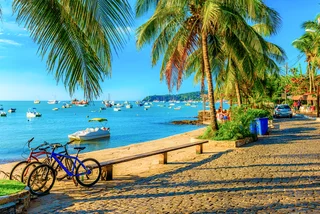In the future, when the folks at Buckingham Palace put marmalade on their royal toast, there’s a very good chance it will come from Pohoří, a tiny town on the Czech Austrian border.
Actually, tiny is an understatement. With a population of one, Pohoří qualifies as the smallest town in the Czech Republic. And that independent inhabitant is none other than Blanka Milfaitová, certifiably the best marmalade maker in the world.
In March 2013, Milfaitová’s lemon marmalade won her the title of “World’s best Artisan Marmalade Maker” in the World’s Original Marmalade Awards & Festival, held annually in Dalemain, England.
“The winning marmalades of Blanka Milfaitová stood out as they had good acidity, were fully fruited, low sugar and great zest. Like a good wine, marmalade needs to have good fruit and full body,” said contest judge Jonathan Miller, food buyer at Fortnum & Mason.
The victory led to a flurry of orders, including one from Fortnum & Mason, sole supplier of goodies to Buckingham Palace.
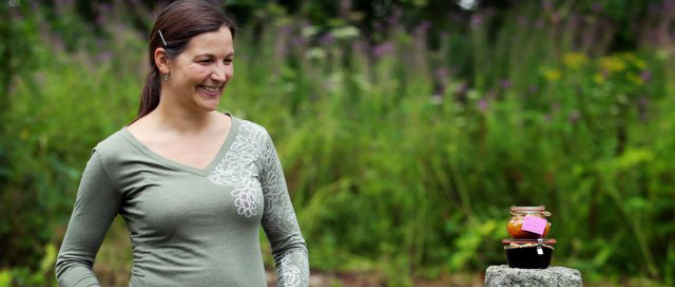
The Naše Dobroty (Our Goodies) line of marmalades
The Naše dobroty (Our Goodies) label, hand-written by Milfaitová herself, can also be found in Paris, Zurich, London, Berlin, Rome and at various farmers markets in the Czech Republic.
You can even pick up a jar in the duty-free shop in Doha airport.
“We’re right next to the diamond bracelets,” Milfaitová laughs.
And as if that weren’t enough, in August she won two double gold stars in the Great Taste Awards (also known as the Culinary Oscars).
“Sunshine in a jar,” the judges ruled on her lemon marmalade.
The secret of her success lies in freshness and the human touch. She will not use a food processor, claiming it turns the fruit into mush. Everything is chopped, sliced or cut by hand. And when it comes to freshness, she will go to the ends of the earth to deliver. Literally.
The lemons for the prize-winning marmalade, for example, were hand-picked at the apex of ripeness by Milfaitová herself in Amalfi, Italy.
“The drive is pretty expensive, but the return in flavor is worth it. That way we get to select the ripest fruit. It isn’t picked prematurely and shipped in refrigerator trucks like the supermarket stuff,” she reasons.
The same goes for the lavender, gathered in the fields of Provence. Yes, Milfaitová grows lavender in her garden in Pohoří, but she says it just doesn’t have the fragrance imparted by the Provencal sun.
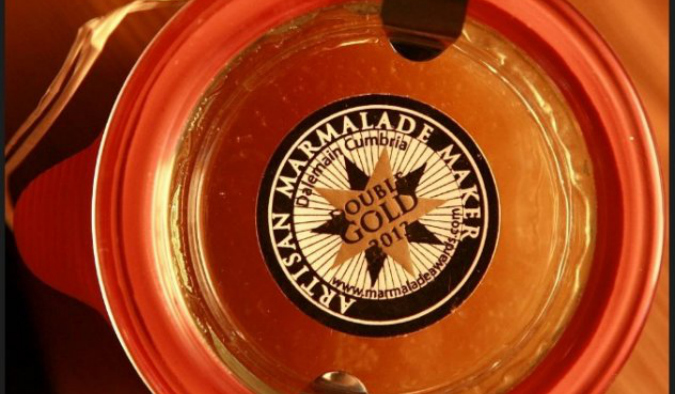
The award-winning lemon flavor
To be sure, you pay for what you get: on her website www.nase-dobroty.cz, jars of her marmalade retail for 150 CZK and more.
Oddly, the world’s best marmalade maker has no formal training in the marmalade or any other culinary art. In fact, three years ago, marmalades weren’t even on the roadmap.
In 2010, she fled an office job in Plzen to open a café in Srní, a small resort in the Bohemian Forest. One day a friend brought her a crate of fresh peaches. She put them in a pot, added a few handfuls of mint from her garden and the rest was history.
By 2012, she was making more from her marmalades than from the café and she decided it was time for another change.
A random drive in the country, plus a few wrong turns, brought her to the end of the road, literally, in the town of Pohoří – the ghost town of Pohori, to be exact.
Located one kilometer from the Austrian border, it had once been home to some to 1,300 Sudeten Germans, all evicted after World War II. The Czechs that moved into their abandoned farmsteads found life in the undeveloped region too harsh to endure and the town died.
By the time Milfaitová and her partner moved in, all that was left were the bare stone walls of a church and a few summer cottages. The only place that remained relatively intact was the graveyard.
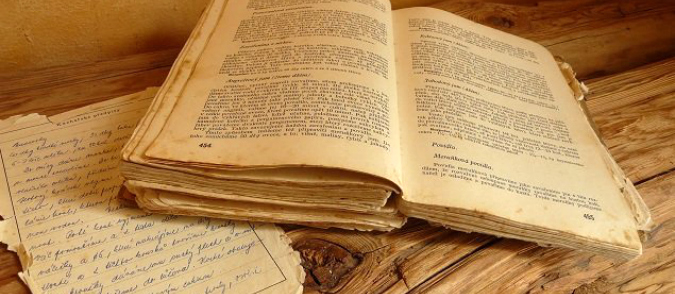
Marmalade recipes of yore
And talk about isolation! Her nearest neighbor is a pension five kilometers away in Baronův most, the nearest store is 11 kilometers away in the village of Pohorská ves. But Milfaitová doesn’t mind the complications.
“You’d be surprised at how much you don’t need,” she says. “Often, rather than drive to a shop for something, I just decide I don’t want it – it’s so much easier.”
As for the solitude, she has embraced it. An avid photographer and writer, she posts photos and musings from long rambles along the abandoned lanes on the company website.
Presumably, all this has changed somewhat since Dalmain, catapulted her into the Big League. A whirlwind of lectures and appearances on cooking shows, such as the BBC Food Show now seriously cut in to her marmalade making time.
To take up the slack, and meet the soaring demand, she is initiating a 28-year-old banking technician from Prague, into the marmalade art.
“Bára wanted to change her life, and she succeeded,” Milfaitová says. “She is my treasure.”
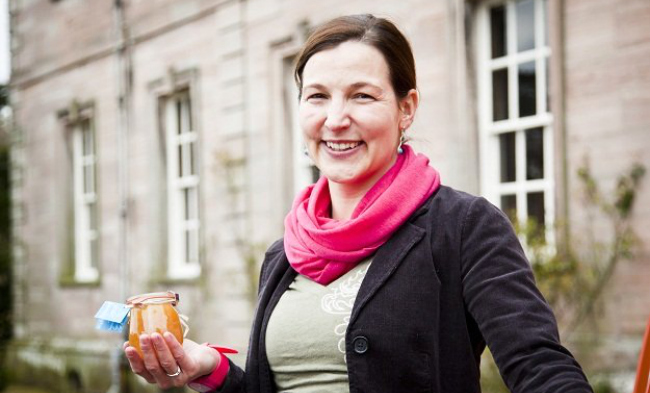
Milfaitová at the World’s Original Marmalade Awards in Dalemain, England.
Of course, Milfaitová has not let the limelight deflect her from her ultimate quest: freshness. To this end, she has a new and daring plan: to take her marmalades on the road.
With Bára holding the fort at home, she and her partner will tour the orchards of Europe, making marmalades right in the orchards, shipping the results back home for sale. She also plans to teach seminars and broadcast online.
She got the idea for her “Marmalade Expedition” while gathering lavender in Provence.
“The owner of the field offered us peaches from his orchard. We brought them home, but I thought how much better it could be if you set up your stove and cooked the marmalade right under the tree,” Milfaitová explains.
The first stop is Sicily, where the lemon harvest is just starting. In all, 35 countries, from Nordkap to Morocco are on the program. Everywhere, she plans to use the best fruits and spices the region has to offer.
“Every country has something to offer our marmalades,” Milfaitová writes in her blog. “And because the freshest and the best can’t come to us, I have to go to it.”
**
What’s your favorite Czech-made marmalade?
Related articles
- Farewell Fake Rum? A Short History of the Endangered Czech Spirit
- Cocktail Emporium with Prague-Themed Drinks Opens on Wenceslas Square
- Prague Named among Top 10 Vegan-Friendly Capitals In 2017
- Czech Republic Will Continue to Fight Inferior Food Quality
- Take a Look Inside Prague’s New Temple For Meat Lovers












 Reading time: 5 minutes
Reading time: 5 minutes 























